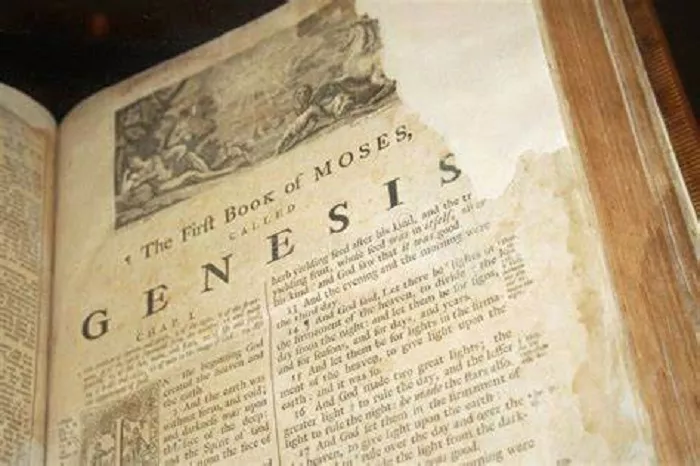Genesis is the first book of the Bible. It tells the story of creation, the early history of humanity, and the beginnings of the nation of Israel. Understanding the original language of Genesis helps us appreciate its meaning and significance. It also provides insight into the cultural and historical context in which it was written.
The Original Language: Hebrew
Genesis was originally written in Hebrew. Hebrew is a Semitic language. It was spoken by the ancient Israelites. Hebrew is the language of most of the Old Testament. Knowing that Genesis was written in Hebrew helps us understand its literary style and structure.
See Also: What is Genesis in Hebrew?
The Significance of Hebrew
Hebrew is a rich and expressive language. It uses a root system. Most Hebrew words are built from three-letter roots. These roots convey core meanings. The richness of Hebrew adds depth to the text of Genesis. Understanding Hebrew nuances helps us grasp the full meaning of the original text.
Hebrew Alphabet and Writing
The Hebrew alphabet consists of 22 consonants. It does not have vowels in the original script. Vowels were added later through a system of dots and dashes called “niqqud.” The script used in Genesis was likely an early form of Hebrew writing. This ancient script evolved over time into the modern Hebrew script.
The Importance of Oral Tradition
Before Genesis was written, its stories were passed down orally. Oral tradition played a crucial role in preserving these stories. The Hebrew language was well-suited for oral transmission. Its poetic and rhythmic qualities made it easier to memorize and recite. The transition from oral to written tradition ensured the preservation of these foundational stories.
Moses as the Author
Traditionally, Moses is considered the author of Genesis. He is believed to have written the first five books of the Bible, known as the Torah or Pentateuch. Moses would have written Genesis in Hebrew, the language of his people. This belief is supported by various references in the Bible and Jewish tradition.
Historical Context of Hebrew
During the time Genesis was written, Hebrew was the common language of the Israelites. It was used in daily life, religious practices, and legal documents. The use of Hebrew in Genesis reflects the cultural and religious identity of the Israelites. It also connects them to their ancestors and their shared history.
Comparison with Other Ancient Languages
Several other ancient languages were spoken and written in the region during the time of Genesis. These include Akkadian, Sumerian, and Egyptian. However, Hebrew was distinct in its structure and usage. Understanding these differences helps us appreciate the uniqueness of Genesis and its language.
Translations of Genesis
Over time, Genesis was translated into various languages. The first major translation was the Septuagint, a Greek translation of the Hebrew Bible. This was followed by translations into Latin, such as the Vulgate, and many other languages. Each translation brought new interpretations and nuances to the text.
The Role of the Septuagint
The Septuagint played a significant role in the spread of Genesis. It made the Hebrew Scriptures accessible to Greek-speaking Jews and early Christians. The Septuagint influenced the New Testament writers and early Church Fathers. Understanding the Septuagint helps us see how Genesis was interpreted in the early centuries of Christianity.
The Latin Vulgate
The Latin Vulgate, translated by Jerome in the 4th century, was another important translation. It became the standard Bible for the Western Church for many centuries. The Vulgate’s translation of Genesis influenced Christian theology and Western literature. It provided a bridge between the Hebrew text and the languages of medieval Europe.
Modern Translations
Today, Genesis is available in many languages. Modern translations strive to be faithful to the original Hebrew text while making the text accessible to contemporary readers. These translations use advances in linguistic and archaeological research to provide accurate and readable versions of Genesis.
The Challenges of Translation
Translating Genesis from Hebrew to other languages presents challenges. Hebrew words often have multiple meanings. The poetic and narrative styles of Hebrew can be difficult to capture in other languages. Translators must balance fidelity to the original text with clarity and readability for modern audiences.
The Influence of Hebrew on Theology
The original Hebrew text of Genesis has deeply influenced Jewish and Christian theology. Key theological concepts, such as creation, covenant, and sin, are rooted in the Hebrew language. Understanding the original language helps us grasp the theological depth of Genesis.
The Literary Style of Genesis
The literary style of Genesis is influenced by its Hebrew language. It uses parallelism, repetition, and wordplay. These literary techniques enhance the beauty and meaning of the text. Appreciating the literary style helps us understand the artistry of Genesis.
The Importance of Context
Understanding the cultural and historical context of Hebrew is crucial for interpreting Genesis. The Hebrew language reflects the worldview and experiences of the ancient Israelites. Knowing this context helps us understand the messages and themes of Genesis.
Learning Hebrew for Biblical Study
Many students of the Bible learn Hebrew to gain a deeper understanding of Genesis and other Old Testament books. Learning Hebrew opens up the nuances and subtleties of the original text. It allows readers to engage more fully with the words and meanings intended by the authors.
Conclusion
Genesis was originally written in Hebrew. This ancient Semitic language adds depth and richness to the text. Understanding Hebrew helps us appreciate the literary, theological, and historical aspects of Genesis. It connects us to the cultural and religious heritage of the ancient Israelites. Studying the original language enhances our understanding and appreciation of this foundational book of the Bible.


